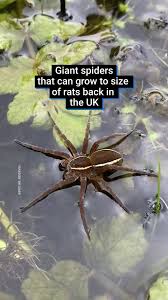
Introduction
Spiders are an essential part of the UK’s ecosystem, playing a crucial role in controlling insect populations. With over 600 species recorded in the UK, understanding these arachnids can help alleviate fears and foster appreciation for their benefits. As the seasons change, awareness of spiders is particularly relevant, especially as some species become more visible during autumn, which is often associated with an increase in spider sightings.
Common Species
Among the many types of spiders found across the UK, a few stand out due to their prevalence and unique characteristics:
- House Spider (Tegenaria domestica): A common sight in homes, these spiders are typically harmless and can grow to around 14 mm in length.
- Garden Spider (Araneus diadematus): Recognisable by their distinctive cross markings on the abdomen, these spiders are prevalent in gardens and fields. They are known for their impressive webs.
- Wolf Spider (Pardosa spp.): Unlike many web-building spiders, wolf spiders hunt down their prey. They are characterised by their speed and hunting abilities.
- Money Spider (Linyphiidae): Tiny but numerous, these spiders are often found in grasslands and are significant in the ecosystem for their role in controlling pest populations.
Behavior and Habitat
Spiders in the UK demonstrate diverse behaviours and habitats. Most thrive in damp environments, while others prefer dry, warm conditions. Common habitats include forests, gardens, and even urban areas. During the mating season, usually in autumn, male spiders are more visible as they venture out to find mates, leading to more sightings in homes and gardens.
Misinformation and Fear of Spiders
Despite their ecological benefits, many people fear spiders, often due to misconceptions. The vast majority of spiders in the UK are harmless to humans. Only a few species, like the False Widow, have been reported to cause mild irritations, yet serious incidents are exceedingly rare. Education about these creatures can help reduce unfounded fears and promote coexistence.
Conclusion
Spiders are a vital component of the UK’s biodiversity and contribute significantly to pest control. As awareness grows, so does the importance of understanding and respecting these creatures. In an increasingly urbanized world, promoting the coexistence of spiders within our environments will benefit both the ecosystem and our gardens. As autumn approaches and spider sightings increase, taking the time to learn about their role can help shift perspectives from fear to appreciation.
You may also like

The Eden Project: A Sustainable Hub for Biodiversity

Understanding Mosquera Wolves and Their Conservation Needs
